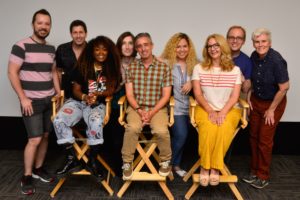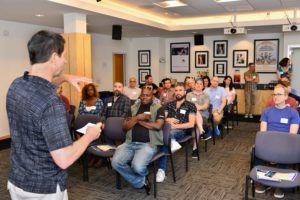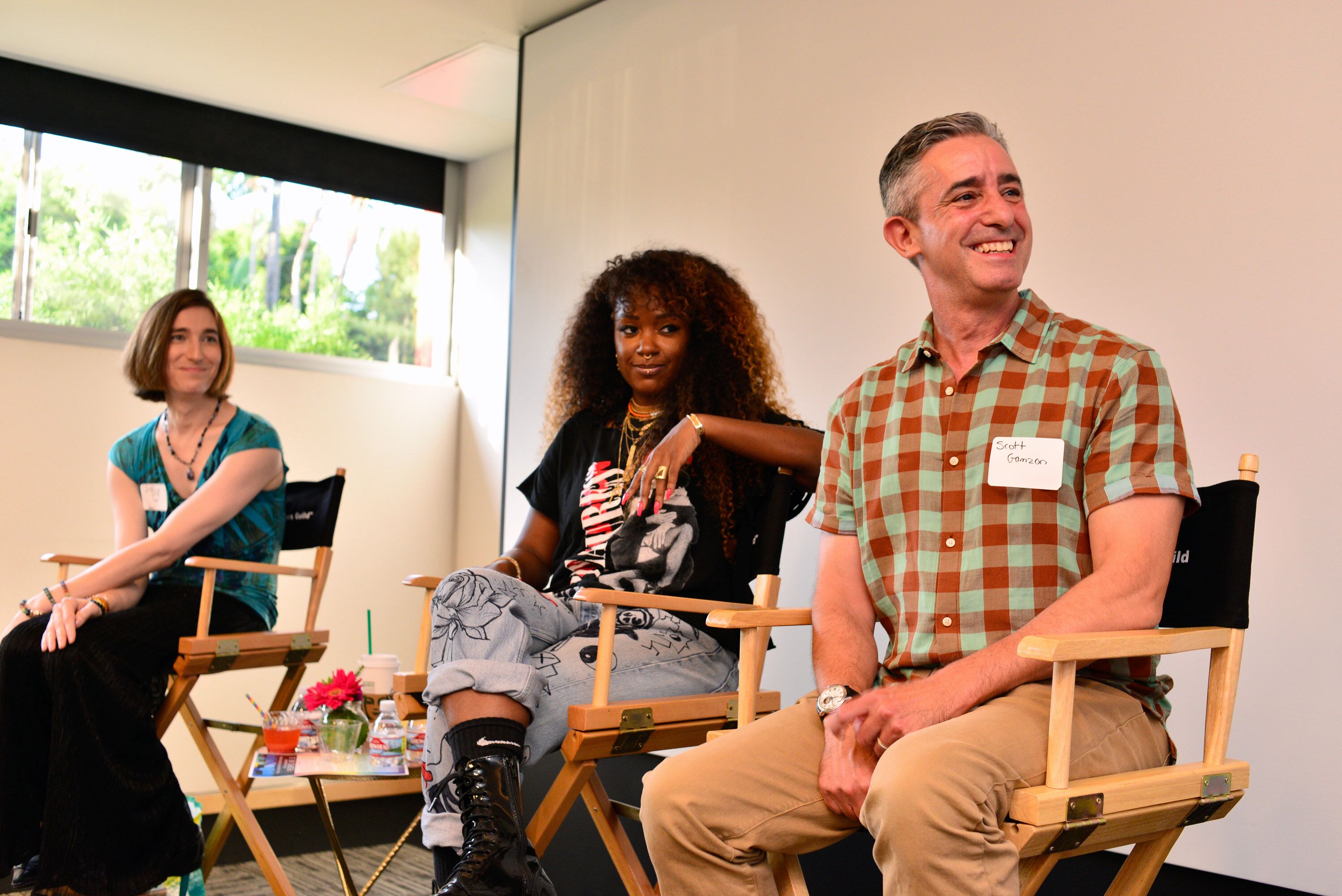by David Bruskin
Scott Gamzon had a hard time at age 22, when he came out as gay to his parents.
“I thought it would be easier,” said Gamzon, now a veteran editor who is a member of ACE, an Emmy winner and a professor at USC.
“My mother had a tough time at first. She said, ‘You’ve had 22 years to figure this out, and you’ve given me five minutes. So give me some time.’ It was actually a really good statement; it helped.”
Gamzon was one of five panelists at Saturday night’s panel discussion “A Conversation with People Like Us,” hosted by the LGBTQ Steering Committee of the Motion Picture Editors Guild. The goal of the meeting was to highlight some of the relevant issues faced by LGBTQ people working in post-production.
In his opening remarks as the panel moderator, picture editor Mark Alan Dashnaw (an Emmy nominee for “Hot in Cleveland”), referring to the event’s title, told the lively and diverse crowd in the Dede Allen Seminar Room in the Guild’s Hollywood headquarters, “We’re taking that phrase, reclaiming it, and flipping it on its head.”
Every panel member said they had experienced harassment or discrimination, or both, on the job, and the hierarchy of the editing room was usually relevant.
As Dashnaw recalled, “The first time I assisted on a network multi-cam show, I was the only new addition. The first month I was there, there was an episode where the main character hires an assistant, and you don’t know if he’s gay or not. So this post-super, kind of a rough-edged guy from New York who I didn’t really interact with or know that much, asks in front of the post- crew, ‘So Mark, is he gay? What does your gaydar tell you?’

Panelists and organizers for Saturday’s “People Like Us” panel discussion.
“And I just kind of froze,” he said. “I hadn’t expressly told anybody I was gay. I was, but it was just such an awkward position to be in. Do I deny it? I had just gotten employed; do I put this person in his place? I don’t even remember what I said; ‘Well, my gaydar’s a little out of focus.’ It was kind of like being outed, and it got me so angry. But I felt like, as an assistant, I couldn’t stand up for myself. The editor, who I barely knew, didn’t call the guy off. The guy was a bully, and an anomaly, and it wasn’t exactly harassment or discriminatory, but it was specifically ‘You’re gay, I know you’re gay, you can’t do anything if I do this to you.’ You just had to suck it up. There was a lot of sucking it up back then.”
Clearing the Obstacles
As picture editor Lyric Ramsey said, “Being different in any respect is kind of an obstacle.”
“I’m always typically that one person in the room: the one woman, or the one black person, or the one black lesbian,” she added. “If you already know you’re ‘the other,’ you don’t want to have another thing stopping you from achieving the dream. In the beginning of my career, when I was an [assistant editor] in reality, it was very much a boy’s-club liquor-in-the-bay type of mentality. After work, everybody was going to the strip club. Luckily, that worked for me, but imagine if there was a woman or a gay man who didn’t like it. As an AE moving up, I wouldn’t have been so forward if I’d had a problem with it.”
“There have been challenges over the past decades about how people perceive you,” said Stevie Waichulis, an Emmy-nominated picture editor. Sometimes there are trust and respect issues. “Or you’re not even invited to lunch,” he added.
At this, others in the room murmured in agreement.

Mark Dashnaw speaks at Saturday’s LGBTQ panel. Photo: Martin Cohen.
Dashnaw asked the panel how being LGBTQ informs one’s creative decisions, if at all. Ramsey said her perspective on footage can shape a scene.
“For instance, I was working on a very popular food show with kids,” she said. “There was clearly a child on the show who was transitioning, but the host was calling this child ‘she.’ I’m sure that’s the wrong pronoun for this person. He’s a boy! He’s changed his name, his haircut, but everyone keeps calling him a ‘she.’ I’m in the edit bay, and I start walking around to ask, ‘Does anybody else see what I see?’ We need VO [voiceover] to change the dialogue here because we should not be calling this winner – he became the winner on the show – a ‘she.’ No one else said anything.”
Ramsey added: “I’m usually the only LGBTQ on a show, so if no one else says anything, it doesn’t get said.”
Although most editors in sci-fi are straight white men, Gamzon works on “Star Trek: Discovery.”
“I’m always looking for worthy emotional beats to draw out amidst all the action sequences, to relate to the characters in a way I don’t see in the other cuts. ‘Star Trek: Discovery’ is one of the first shows to have an out gay couple as main characters. I got to cut the first scene where we find out they’re a gay couple, which was very sweet.” He appreciated the opportunity to make it feel right, and credible.
The panel also included assistant editor Diandra Kendall Luzon, who has participated in the ACE Diversity Mentorship Program.
During a Q&A session following the panel, a black female audience member described seeing LGBTQ discrimination in editing rooms. It was generally agreed that editing room hierarchy does play a role, and that editorial departments are still nearly all white straight men, even when other departments on the same show are diverse. In fact, post-production seems to be one of the least diverse departments in the industry.
A woman in a hiring position said that she and others like her need to be conscious about bringing diversity into these spaces – but, it was also pointed out, hires have to be experienced and competent. ACE has a mentorship program dedicated to bringing people up who can apply their diverse experiences to storytelling.
Another attendee said, “We’re not ‘the other.’ If you count all the groups in the world that get tagged and labeled as the other, it adds up to the majority. We need to start acting that way and stop putting ourselves in a category. When you buy into being the other, you put yourself down.”
David Bruskin is a retired story analyst.


